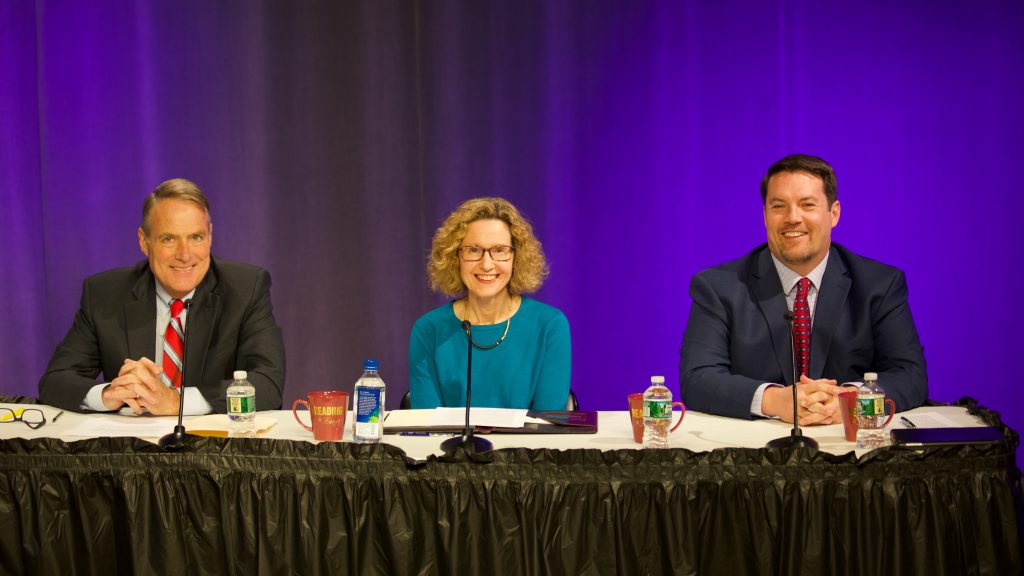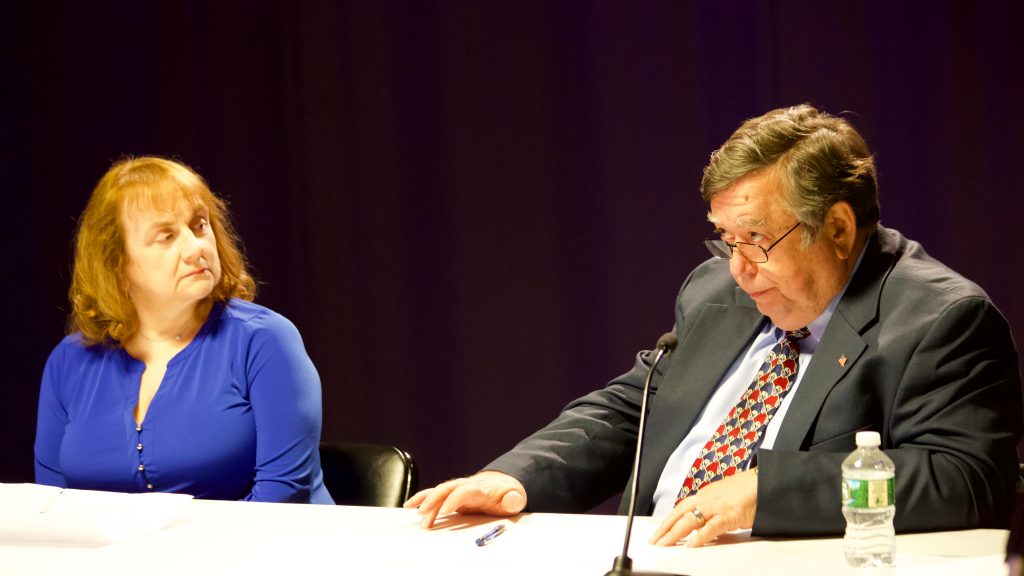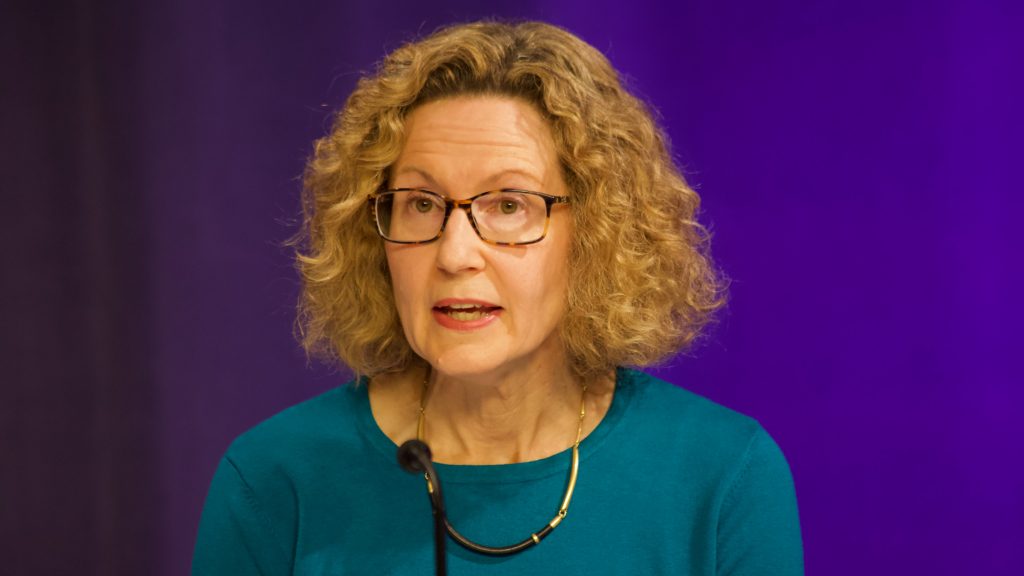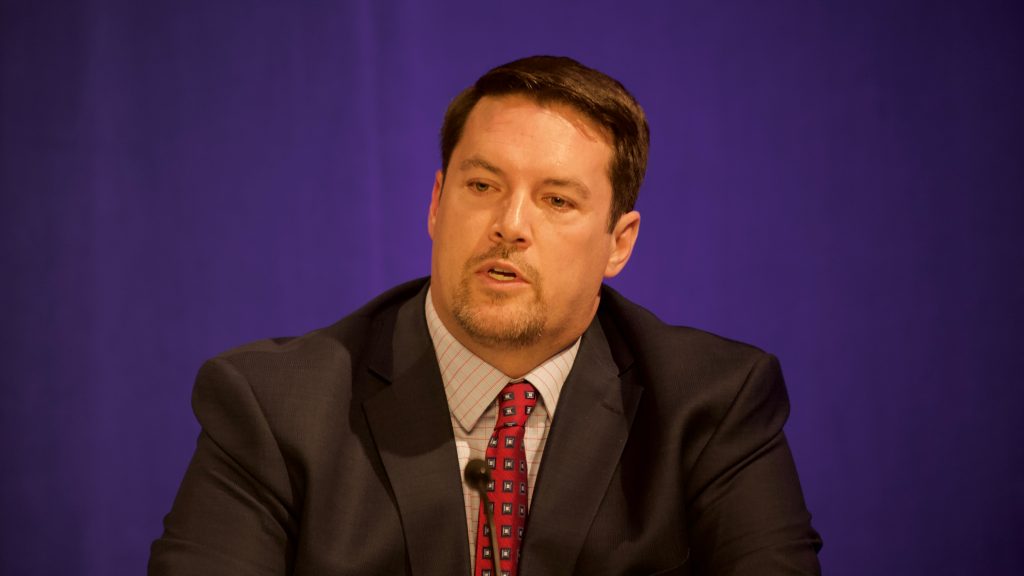 As the April 2 election draws closer, the three candidates for the three-year seat on the School Committee appeared on RCTV on Monday, March 25 to answer questions and share their vision for the future of the Reading Public Schools. The candidate for the two-year term on the school committee, John Henry Parks, was not able to attend. The forum was hosted by Alan Foulds and questions were posed by Joanne Senders of the Reading Advocate and John Carpenter of RCTV. Each candidate answered the same questions.
As the April 2 election draws closer, the three candidates for the three-year seat on the School Committee appeared on RCTV on Monday, March 25 to answer questions and share their vision for the future of the Reading Public Schools. The candidate for the two-year term on the school committee, John Henry Parks, was not able to attend. The forum was hosted by Alan Foulds and questions were posed by Joanne Senders of the Reading Advocate and John Carpenter of RCTV. Each candidate answered the same questions.

Joanne Senders of the Reading Advocate and John Carpenter of RCTV
Patricia Calley has been a Reading resident since 1996 and is a speech and language pathologist in the Andover Public Schools with a masters degree from Syracuse University. She believes that her long career in education positions her to be a strong voice on the School Committee.

Patricia Calley
Calley cited her effort on a team that drafted regulations regarding the qualifications for speech and language pathologists as an example of one of her accomplishments. She also believes that her participation on the teacher side of contract negotiations gives her unique insight into the process. Calley stated that there is room for more positive outreach from the school department to the community, and though she is not as well-versed regarding the high school curriculum, she does believe that students should be made aware of the many wonderful careers that do not require a four-year degree. She indicated that she “brings specialized training to the table” when looking at special education programs and that money can be saved in special education by bringing the right programs to the district that would limit the need for out-of-district placements. Calley believes that all kindergarten students should be in full-day programs, and she dislikes the “integrated” model of mixing full-day and half-day students in the same classroom. She thinks that drug education programs have not done enough to recognize social media pressures that students face, and believes that more recess time for younger students will help ensure building blocks that support learning. Calley would look for experience at all levels, communication skills, and a good reputation as a team builder in a new superintendent if one was needed. In closing, she stated, “I believe that I have the skills and understanding to help students and educators.”
Chuck Robinson has served on the School Committee for twelve years including four terms as chair. He has three children that have graduated from the Reading Public Schools, with one more currently a student at the high school. He believes that the best student outcomes are a result of hiring the “highest quality educators” at all levels of the school system.

Chuck Robinson
Robinson touted his record as a leading voice in getting additional resources for Joshua Eaton Elementary School, guiding the committee through a successful Proposition 2 1/2 override, and participation in several contract negotiations as reasons why he should re-elected. “There is much more to do in the Reading Public Schools and we must strive for continuous improvement,” Robinson said. He believes that the use of social media for communication with the community is “something to look at carefully” and that the school department needs to do a better job with communication. Robinson believes that the entire experience of high school, including academics, is important for preparing students for what is next though he cautioned, “We cannot offer everything.” He pointed out that in-district special education offerings have expanded from one program when he started on the committee to eight currently. Though these cost money, they aid in student inclusion and are cost-savers in the long run. He does believe that all of the special education programs should be reviewed in a similar manner as the program at Parker Middle School was this past year. Robinson believes that “everything should be on the table” when it comes to full-day kindergarten and space issues, noting that ninety percent of parents now seek this option, despite having to pay extra. He would like to find creative ways for coming up with the approximately $1.3 million needed to make the program universal and free. Robinson believes a continued emphasis on social and emotional learning at younger ages will help address the core issues of substance abuse amongst students. He believes better communication is one long-term goal for the district that needs to have greater emphasis. If needed, he would look for a superintendent who is a great communicator with a background in budgeting who has worked their way up through the ranks. In closing, Robinson stated that, if elected, he would continue to focus on financial oversight and accountability, promote inclusion and acceptance in the schools, review special education programs, move forward on the space issue, and seek to maintain the sustainability of the override.

Thomas Wise
Thomas Wise came to Reading in 2006 and chose to live in this community principally because of the schools. He has two children at Parker Middle School, both of whom previously attended Joshua Eaton Elementary School. He has been an active volunteer in youth soccer and little league and served on the Joshua Eaton Task Force established in 2014. He has also been a member of town meeting.
Wise cites his work with many town departments to create a new accessory apartment bylaw as a major accomplishment in the community. He believes that the school department needs to broadcast the successes of the high school, in particular, to aid communication with the community. “People want to see that their money is spent efficiently,” he added. He also stated that there should be greater use of social media in communicating with the community. Wise believes that opportunities for advanced education at the high school are there for students who want them, including clubs and other experiences. He is concerned about the collapsed tracks at the high school and he would like to see more advanced business classes offered. He also expressed concern that the special education budget has risen from $3.5 million to $5.5 million in just three years. He believes that early identification of learning issues such as dyslexia can help curtail this growth. He also would like to see a “parents rights” policy for parents of special education students “so it is not always a fight” to get needed services. Wise thinks that the school committee should create a policy, not just guidelines when it comes to full-day kindergarten and believes that space-saving measures such as “art-on-a-cart”, and “music in the auditorium” should not be casually dismissed. He also thinks that a full day kindergarten lottery has to “come into the fold.” He floated the idea of seeking rental space in town for the central office so that the space in the high school could be utilized for student needs. While admitting “there is no easy answer” to the substance abuse problem, he believes that effort should be taken to determine where a child “went off course.” He suggested that studies show that more recess in early years “brings a joy and ability to learn.” Wise would like to make district goals more specific and measurable and would like to add a goal around combating the issue of dyslexia. If a new superintendent were needed, Wise would look for a proven servant-leader who is action oriented and well versed in scientific evidence. He would not be opposed to looking for someone outside of the education system. He closed by reiterating his desire to look at out-of-district special education spending, create a social media policy, and use “smart goals” in the superintendent’s review process.
Foulds closed the forum reminding viewers to vote on April 2 and about the upcoming 375th anniversary celebrations.
https://www.facebook.com/RCTVStudios/videos/1984771048298142/
